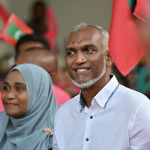The Maldives, South Asia’s smallest nation-state, sent a clear signal through its latest presidential election: democracy is thriving. The holding of yet another free and fair election enhances the country’s international prestige. The key issues at play related to the concerns of voters, especially young voters, for their economic well-being: employment, housing and improvements needed for the tourism industry, education, and healthcare. Therefore, to portray the election as a football match between China and India resulting in the latter’s defeat – as some Western news agencies have mischievously done – is to betray ignorance of how this nation of 1,192 islands functions. Luckily, the people of Maldives know better.
The country has progressed considerably since Maumoon Abdul Gayoom ruled as the president from 1978 to 2008 gave way to a multiparty democracy under a new constitution. Mohamed Nasheed, a charismatic but mercurial leader, became the first directly elected president of the Maldives. He did not complete his five-year term and ended up sharing it with Mohamed Waheed Hassan. Abdulla Yameen, the most pro-China president so far, served his full term (2013–18), followed by Ibrahim Mohamed Solih, the candidate of the Maldives Democratic Party (MDP) and the architect of ‘India First’ policy, who has led his nation from 2018 till now. Following his defeat, he will hand over the presidency to the clear winner – Mohamed Muizzu, the opposition candidate backed by an alliance of the Progressive Party of Maldives (PPM) and the Progressive National Congress (PNC). The mayor of the capital city Male, Muizzu will be sworn in as the new President next month.
Objectively, the outgoing president had a commendable term in office during a difficult period marked by Covid, the Ukraine war, and the global economic slowdown that affected Maldives too.
Why then, was Solih defeated?
Three reasons. First, he was fighting against the currents of history: no incumbent has been re-elected in the Maldives. People feel empowered by the weapons of democracy, to bring in and oust rulers. Second, what seemed a certainty became inevitable once the ruling MDP party split and Nasheed exited. Solih’s apparent attachment to the presidential chair clashed with Nasheed’s overwhelming ambition. No reconciliation was forthcoming and, as a result, Solih lost by the same margin – about 8% of the votes – in the second round that Nasheed’s candidate had scored in the first round.
Third, old-timers believe that with Nasheed, a communicator par excellence, gone, MDP could not effectively counter the disinformation campaign launched by the opposition alliance, which inserted, unnecessarily, the issues of geopolitics in a domestic campaign. But in politics, perceptions matter. With Nasheed’s departure, the ruling party lost its “motherboard”.
The election results have triggered rapid developments. At the request of president-elect Muizzu, President Solih agreed to shift former president Yameen from prison to house arrest. Yameen is serving an 11-year sentence for corruption and money laundering. He is seen as Muizzu’s mentor. Hence, the first facet of Maldivian politics to watch now is the type of dynamic that develops between these two men.
Political compulsions may operate in the beginning, but the logic of power and the magic of a presidency work alike everywhere. It can be expected that the Mayor of Male will soon begin to think and act like a president, conscious of his obligations to all his people and his august regional responsibilities. He may focus on domestic priorities of development while leveraging foreign policy to promote his nation’s interests.
In external relations, the new administration will have at least three choices: revert to the ‘India Out’ stance of former president Yameen; continue the ‘India First’ policy of the outgoing president; or innovate a calibrated policy that allows a balancing of relations with its key partners, especially China and India.
The world has changed since Yameen’s time. The Belt and Road Initiative (BRI) which Maldives had accepted under his leadership, is in serious trouble. The Chinese investment in Sri Lanka led to a financial crisis, which required India’s help. Finally, the Islamist constituency in the Maldives, not particularly friendly to India, will no doubt note the changed equations between India and the Gulf States. It is reflected also in the waning interest of West Asia in a bankrupt Pakistan, which has long nurtured extremism in the Maldives, and can hardly provide succour to those elements in the island state.
For India, the next phase of regional diplomacy may admittedly be complex. But enough assets and achievements exist to impart confidence. At the people’s level, a positive mindset prevails towards India. This has been reinforced by extensive development work and numerous small community development projects already completed such as the building of community centres, children’s parks, and student ferries between islands. Thousands of Maldivian youth have been to India for training and capacity-building programs in the past five years. India is a major source of tourism, imports and investment, and it zealously nurtures its role as the first responder every time an emergency strikes Maldives.
But more can be done and should be considered. First, the Colombo Security Conclave – with India, Sri Lanka, Maldives, Mauritius, and Seychelles as its members – should be strengthened showing tangible outcomes in maritime security and the development of the Blue Economy. By boldly re-imagining the post-SAARC South Asia, New Delhi should create a basis for BIMSTEC to invite Maldives as an Observer at its summit next month. Finally, there is the perennial need for additional resources so that India’s strategic community and media organisations take a greater interest in a small but vital neighbour, building bridges of mutual understanding and trust.
Rajiv Bhatia is Distinguished Fellow, Foreign Policy Studies, and a former ambassador.
This article was first published by The Hindu.


